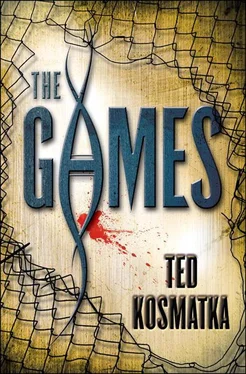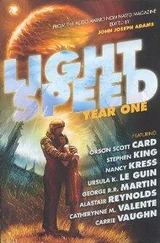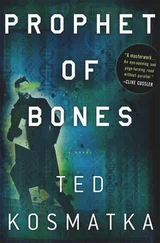He looked down at his watch and grimaced. Half past two in the A.M. He wondered vaguely if Silas had gone home yet. His hand lingered on the videophone at the side of his lab bench. Better to wait until he had firm results, he decided. He didn’t want to embarrass himself if the bizarre results from his first analysis had simply been the artifact of some careless mistake on his part. He glanced at the electrophoretic gel drying on the counter. Yes, it had to be a mistake.
When the gel solidified enough to maintain its internal structure, Benjamin slid the new set in the vacuum oven, where the DNA fragments would fix to the metered filter. He punched two hours into the digital timer and hit the start switch. His feet seemed to weigh sixty pounds apiece as he dragged himself to the other side of the lab and collapsed into the swivel chair. He kicked his shoes off and propped his feet up as far as they would go onto the desk. His eyes closed.
There was no dream, just the total nothingness of exhaustion, less like sleep than a subtraction of consciousness. When the buzzer went off two hours later, he managed to hoist himself to the upright position. A sharp pain lanced at his neck when he straightened his head. His left leg was completely numb from the hip down, and he had to rub it vigorously to bring it back to life.
Benjamin pressurized the vacuum chamber and used a pair of tongs to remove the fixed set from the oven. He lowered the nitrocellulose filter into a hybridization buffer and prepared an autoradiograph to visualize the relative positions of the complementary DNA sequences.
Nearly an hour later, just as the first glow of morning was beginning to light the world outside the window, Benjamin finished the restriction map. It was done.
He held the gossamer plastic sheet up to the light.
The polymorphisms were unmistakable.
The genetic diversity contained within the newborn’s genome was like nothing he’d ever heard of. Very few bands lined up together on the sheet. It was heterozygous across most tested loci. Half of the young gladiator’s genes were apparently either co-dominant or unexpressed recessives.
Why engineer unexpressed genes into an organism? What were those recessives hiding?
Ben rubbed his eyes. Perhaps the more important question was Why had the world’s most powerful supercomputer put them there in the first place?
He looked at his watch: 5:47. Picking up the receiver, he hit the call button on the vid-phone. He’d try Silas’s office first.
SILAS WAS washing his face in his office’s bathroom sink when the phone rang. It had been a long night. He pulled a towel down from a ring and patted his face dry. This early in the morning, he knew exactly who was at the other end of the line.
“Hello, Benjamin.”
“Silas, I’m glad I caught you. Are you early to work, or late getting home?”
“Home? Haven’t been there in a while.”
“I know what you mean. Listen, I just got the results of the restriction map. I double-checked it. You might want to come down and take a look.”
“Yeah, but give me a minute. I’m just trying to wake myself up. Wait, better yet, why don’t you meet me in the cafeteria for some coffee? I want to show you the karyotype I just finished.”
“Is the cafeteria open this early?”
“It is if you have a key.”
“Must be good to be boss.”
“Now I know you’re sleep-deprived. I’ll trade you anytime you want.”
“No, thanks, but I’ll see you in five.”
SILAS RAISED the coffee cup to his lips with one hand and held the restriction map with the other. He willed his sleep-fuzzied eyes to focus. At forty-three, he was doing a good job staving off the optometrist, but his eyes did take a little longer to wake up than the rest of him. “You double-checked this?”
“Yeah,” Benjamin said. “I knew you’d ask.”
They sat in the empty cafeteria—a huge, open expanse of white tile divided by endless rows of glossy plastic tables. Against one wall was the kitchen and the glass refrigeration units. Every kind of snack or food or drink you could ask for. Enough to feed a small army of hungry, caffeine-addicted techs. Three hundred people might eat here for lunch. Right now, it belonged to just the two of them.
They sipped their coffees.
Silas put the plastic sheet down on the table and handed Benjamin a white page he’d pulled from the briefcase sitting on the floor. “This is what I was working on,” he said. “Don’t bother counting, there are one hundred and four.”
Benjamin whistled softly as he looked over the sheet. “A hundred and four chromosomes?”
“Certainly puts our paltry twenty-three in perspective.”
Ben shook his head as he studied the sheet. He’d never seen a karyotype like this before. The chromosomes were laid out in neat pairs from largest to smallest, across and down the page. They took up the whole sheet. Benjamin adjusted his small wire-rimmed glasses. “This is some dense reading.”
“Yeah, I get the feeling that might be the whole point. With this bulk of material involved, back-engineering wouldn’t be time-effective. There’s just too much to dig through.”
“With a large enough team, we could probably make sense of at least part of this before the competition.”
Silas shook his head. “With five years instead of thirteen months, we still wouldn’t unravel this, particularly with the diversity in the restriction map you just handed me. It almost seems as if this thing was designed to throw up roadblocks to any sort of investigation. It doesn’t want to be understood.”
“You mean Chandler didn’t want it understood?”
“I’m not sure what I mean.”
Benjamin laid his forehead down on the table. “So what next?”
Silas looked at the stack of papers that Benjamin had handed him when he first walked into the cafeteria. “I’m open to suggestions,” he said. “You got any ideas?”
“Yeah, but most of them would make me look like a crackpot.” Benjamin stretched in his chair. “Oh, hell, you’re the … What was it the magazines were calling you last time? The genetic pioneer? What do you think?”
“I think my pioneering days are over. But I’ve got one more idea.”
“What’s that?”
“How about we get some doughnuts to go with this coffee?”
“That’s your idea?”
“Only one I can come up with right now.”
“Well, it’s the best idea I’ve heard today.” He sipped his coffee. “Though my standards are low this early in the morning.”
STEPHEN BASKOV flipped through the report on his desk. He tried to force back the growing sense of apprehension that threatened to muddle his thinking. His mind needed to be sharp to face the decisions ahead.
He eased his chair back and ran a hand through his white hair. It had taken two frustrating weeks to track down the directives used by the Brannin computer. There had been no record of it at the Five Rings complex. The scientists at Helix were able to produce literally thousands of bytes of data on biology, physiology, and genetics, which they had given to Chandler’s team for upload. But there were no directives, nothing to guide the design parameters. Earlier today, when he’d finally discovered where the directives originated, he’d come very close to a total meltdown.
His own commission had developed them.
Several people nearly lost their jobs before lunch, but eventually, he’d decided it wouldn’t be in his best interest to have disgruntled ex-assistants floating around at this most inopportune of times.
He glanced at the papers on his desk. Stupid. Stupid . He couldn’t think of a more fitting descriptor. The report on his desk summarized the raw data that the Brannin was given before the design stage of the program. The vast majority of the text was comprised of information on the gladiator contest itself—the arena dimensions, the contest rules, as well as the specs of all past contestants. Winners and losers. There was also, thank Christ, a list of qualifications.
Читать дальше












